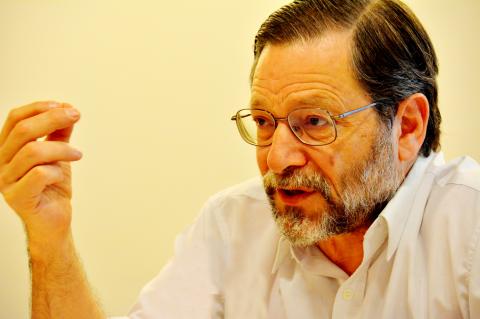|
Think again, mister —
Taiwan isn’t actually ‘small’
By J. Michael Cole / Staff reporter

Taiwan specialist Bruce Jacobs
responds to a question at the Foreign Correspondents Club last week.
photo: j. Michael Cole, Taipei Times
Fresh from months lecturing across Europe
and North America, Taiwan hand Bruce Jacobs, professor of Asian languages and
cultures at Monash University in Melbourne, argued in Taipei last week that size
doesn’t matter — or to be more precise, that Taiwan isn’t, despite the popular
view, “small.” As he sees it, the realization that Taiwan is in fact a “middle
power” could have implications not only for how we look at Taiwan, but perhaps
more importantly, for its ability to forge a path for itself.
With Typhoon Soulik homing in on Thursday, its structure more than twice the
size of Taiwan proper, it was easy to think that Jacobs had perhaps lost all
sense of proportion after traveling large expanses of territory in recent
months. Or maybe not.
“Its [Taiwan’s] population, equal to that of Australia, is larger than
two-thirds of the world’s nations and its area is greater than two-fifths of the
world’s nations,” Jacobs told the foreign correspondents’ club in Taipei, adding
that combined with its advanced economy, Taiwan was — and should act as — “an
important world ‘middle power.’”
In saying so, he was clearly contradicting what other academics who have written
about Taiwan, including the eminent Shelley Rigger in her book Why Taiwan
Matters: Small Island, Global Powerhouse, had argued.
Jacobs was on to something here, and perhaps he was reminding us of the mistake
we had all committed — Taiwanese included — by looking at Taiwan solely from the
perspective of the 800lb gorilla in its immediate neighborhood. Size is indeed
contingent on what an object is compared to. In other words, it is relative. And
it is also as much a term of geography as it is a state of mind.
He didn’t say much more about size, but a few hours before he was set to return
to Australia, I contacted him again and sought to hear more of his views on the
subject.
Starting from the position that the Ma Ying-jeou (馬英九) administration behaved as
if Taiwan was in fact a small power, I asked Jacobs whether attempts by the Lee
Teng-hui (李登輝) and Chen Shui-bian (陳水扁) administrations to behave like a middle
power, with their emphasis on official diplomacy, had backfired and perhaps
forced the Ma administration to downsize Taiwan for the sake of better relations
with China and the rest of the world. Put differently, I asked him whether the
international community itself wanted Taiwan to be small.
Of course, what I really was doing was tiptoeing around the adjective that
Washington has often used to describe Chen — “troublemaker” — and Jacobs saw
right through my tactic.
“I don’t think that is correct. Chen was called a troublemaker because he was
seen to have interfered in the China-US relationship. I don’t believe the George
W. Bush administration’s attitude was correct,” he said.
Paul Wolfowitz, Bush’s deputy secretary of defense, had told me something
similar when he described Washington’s attitude toward Taiwan during those heady
years. The Bush administration, busy waging two wars, had not paid enough
attention to Taiwan’s needs and had perhaps treated Chen unfairly by calling him
a troublemaker.
So perhaps Taiwan would get away with it if it sought to punch at its weight for
once. But for this to be possible, Jacobs tells us, a whole mindset needs to be
changed through articles, books and the willingness of Taiwanese officials — the
very same people who when representing the nation abroad constantly use the
terms “small” and “tiny” to describe their country — to recognize the fact that
their employer is in fact a sizeable member of the international community.
If I could add one thing to Jacobs’ views on size, it would be that besides the
need for thinkers and officials to educate the world about Taiwan’s true size,
Taiwanese themselves need to be better informed about the rest of the world, if
only so that they can cultivate the mindset that their nation in fact isn’t a
small dot lost in an immense ocean, but that it can be heard abroad, if only its
people are confident and realistic enough about their own national power.
Size is a state of mind, Jacobs tells us, and he thinks — hopes — that Taiwanese
can think big.
|
![]()
![]()
![]()